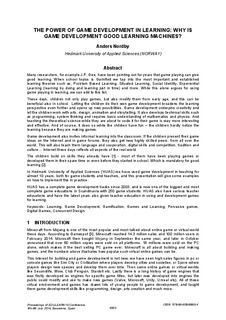| dc.description.abstract | Many researchers, for example J.P. Gee, have been pointing out for years that game playing can give good learning. When school topics is Gamified we tap into the most important and established learning theories such as, Problem Based Learning, Situated Learning, Social Identity, Experiential Learning (learning by doing and learning just in time) and more. While this alone argues for using game playing in learning, we can add to this list.
These days, children not only play games, but also modify them from early age, and this can be beneficial also in school. Letting the children do their own game development broadens the learning perspective even further and opens up new possibilities. Game development underpins creativity and let the children work with arts, design, animation and storytelling. It also develops technical skills such as programming, system thinking and requires basic understanding of mathematics and physics. And teaching the theoretical science while they are about to code it for their game is way more interesting and effective. And of course, it does so while the children have fun – the children hardly notice the learning because they are making games.
Game development also invites informal learning into the classroom. If the children present their game ideas on the Internet and in game forums, they also get new highly skilled peers, from all over the world. This will also teach them language and cooperation, digital skills and competition, tradition and culture… Internet these days reflects all aspects of the real world.
The children build on skills they already have (Prensky, 2011) - most of them have been playing games or developed them in their spare time or even before they started in school. Which is mandatory for good learning (Gee, 2007).
In Hedmark University College (HUC) we have used game development in teaching for almost 10 years, both for game students and teachers, and this presentation will give some examples on how to implement this in practice.
HUC has a complete game development tracks since 2003, and is now one of the biggest and most complete game educations in Scandinavia with 250 game students. HUC also have various teacher educations and have the latest years also given teacher education in using and development games for learning. | nb_NO |
